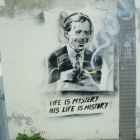Poet Glazov reports on VHL experience in Belarusian paper
May 15, 2012

The Belarusian newspaper Brestskij kurjer carried out an article at the very beginning of May entitled “Prague Spring: Poets from Brest and Minsk’s five days in Europe’s most beautiful city.” In the piece, its author, the poet Vladimir Glazov, returns to that visit to Prague – and above all to the Václav Havel Library.
Poets Beyond the Mainstream at the Václav Havel Library
The Poets Beyond the Mainstream literary evening took place at the Václav Havel Library on 19 April. The title alone was enough to compel us, though it also gave us stage fright.
It should be said that Max did a good deal of the work to ensure the evening could happen. He translated our poems into Czech and arranged with the actor Daniel Vavřík for him to read them, as well as sending out invitations. He was helped by one of the library’s associates, the coordinator Tereza Selmbacherová. Another participant, Siarhei Smatrychenka, interpreted our comments on the poems, as well as the very intense and interesting debate with the audience that followed the reading.
Naturally, we awaited our appearance nervously. Who would come? How would they receive us? In order to calm our jitters at least somewhat we met downstairs for a glass of wine in a café with the fitting name Montmartre. It surprised me that despite the size of Prague’s Belarusian community, most of the audience were Czech. That made us even more nervous. We were introduced by one of the most interesting contemporary Czech writers and the cultural director of the library, Jáchym Topol. Then Max Shchur spoke. He said contemporary Belarusian literature was not only a handful of ever repeated names but rather consisted of many less well known, mainly young, writers who mainly write “for themselves”, in both Belarusian and Russian. “None of those appearing are part of either the official or opposition cultural establishment, nor are they working to that end,” he said. “Likewise, our poetry isn’t either post-avant-garde or post-modern, it takes place beyond the streams of fashion. While it’s not entirely correct to dub us a ‘movement’ in the underground style, there is in our poems a clear kindred spirit with representatives of the underground, including Czech ones, from the 1970s and ‘80s.”
We then immediately moved on to the actual reading. I have to say it was a wonderful, unforgettable feeling. First, it was unusual hearing your own poems in another language. Second, we were very pleased by the warm reaction from the audience and the attention they gave each of us. As the youngest of us, and the first to speak, Anton Rudak probably had it hardest. Max had it a bit easier, while my task was merely not to spoil the overall impression created by the two great poets’ readings. Going by how the audience applauded and how instantly they reacted, we could be said to have won them over. We then answered questions for over an hour. People had an animated interest in the political situation in Belarus, how people live there, and problems in the relationship between Belarusian and Russian. It was clear that they were well informed on events in our country. Their welcome and genuine interest in both Belarusian society and the work of all three poets carried over into the unofficial part of the evening. For instance, many people approached me to say they were unused to rhythmic poetry; I was pleased the Czech listeners praised in particular the melodiousness of the poems. Frankly, that was all the praise I needed. Finally, journalist Alexey Znatkievich invited us to visit the Belarusian service at Radio Free Europe the following day.
Vladimir Glazov
Related events
- Poets Beyond the Mainstream 19/04/12 19:00 – 21:00



